 |
Yanggang |
 |
 |
Yanggang means “staunch masculinity” and refers to director Chang Cheh’s martial arts film aesthetics and themes. Chang’s young macho anti-heroes, often betrayed by a corrupt patriarchy, are rebels or outsiders who lived by the code of brotherhood and loyalty (Yi). The gallant heroes often use highly skilled empty-hand kung fu or daggers to battle scores of opponents. Although the heroes are skilled and tough, yanggang films are marked by the intense suffering and violent death of the main characters. Blood, pain and idealized male beauty are intrinsic components of the yanggang film aesthetic. The heroes sacrifice themselves for brotherhood and to eradicate corruption. By doing this they fulfill their higher ideals, thus their tragedy is cathartic.
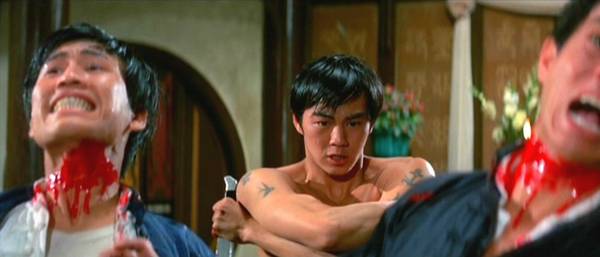
Ti Lung in The Duel
Chang Cheh’s yanggang films of the late 1960’s (One-Armed Swordsman) and early 1970’s (Vengeance !; The Five Venoms) were created in reaction to the domination of Hong Kong cinema by female stories and female wu xia pian stars who save their weak male supporting actors. The yanggang genre started the trend of male-dominated cinema and paved the way for later heroic bloodshed films, in which guns replace blades. John Woo, a former assistant director to Chang Cheh, spearheaded the heroic bloodshed subgenre with films such as A Better Tomorrow (1986) and The Killer (1989).
Sylvia Rorem (August 2010)
Source: Chang Cheh's Revolution in Masculine Violence, A Preface by Sek Kei, in Chang Cheh: A Memoir, English Editor: Agnes Lam, published by the Hong Kong Film Archive, 2004. |
 |
 |
top |
 |
 |
Venoms |
 |
 |
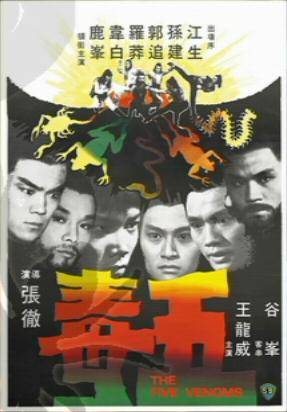 The Venoms is the name of a group of actors/martial artists who gained fame following the success of Chang Cheh's Five Venoms. They appeared as a group in almost two dozens film between 1978 and 1982, including in the kung fu cinema classics Crippled Avengers, Invincible Shaolin and Kid with The Golden Arm. The Venoms are Philip Kwok Chung Fung, Lo Meng, Chiang Sheng, Sun Chien and Lu Feng. A sixth Venom, Wai Pak, only played in four films and cannot totally be considered as a member of the group. Kuo, Chiang and Lu are also action choreographers in most of the Venoms films. The Venoms is the name of a group of actors/martial artists who gained fame following the success of Chang Cheh's Five Venoms. They appeared as a group in almost two dozens film between 1978 and 1982, including in the kung fu cinema classics Crippled Avengers, Invincible Shaolin and Kid with The Golden Arm. The Venoms are Philip Kwok Chung Fung, Lo Meng, Chiang Sheng, Sun Chien and Lu Feng. A sixth Venom, Wai Pak, only played in four films and cannot totally be considered as a member of the group. Kuo, Chiang and Lu are also action choreographers in most of the Venoms films.
Martial artists and skilled acrobats, the Venoms were involved in breathtaking action spectacles. This along with the extravagant stories, colourful costumes, improbable gadgets and bloody carnages so typical of Chang Cheh's films, created some of the most playful, baroque and kitsch kung fu films ever made. Underappreciated in Hong-Kong, the Venoms films have reached a cult status among the Anglo-Saxon kung-fu fandom. The fans are the one who nicknamed the group 'Venoms' or 'Venoms Mob.'
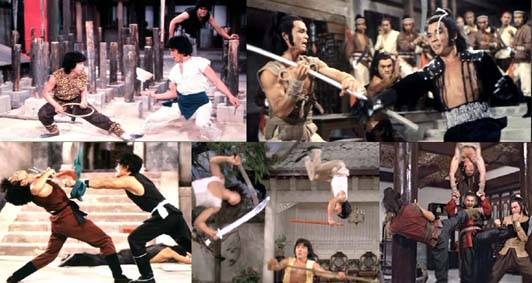
Although the Venoms play different roles from a film to another, their attributes stay more or less the same.

Philip Kwok Chung Fung, the hero in most intrigues, is a martial acrobat, a show-off who is also valiant and shrewd. He is also one of the three action choreographers.

Chiang Sheng is the mischievous kung-fu kid who often adds a small dose of comedy. He is the best acrobat of the group with Kwok. He is also a choreographer and he worked as assistant director on half of the Venoms films.

Lo Meng is a proud, furious yet sympathetic braggart. Chang Cheh adored to film his muscular body and also loved to make him suffer in very bloody death scenes. Lo only appeared on occasions in the Venoms films post-1980.

Sun Chien is the young, earnest expert in Taekwondo. A skilled kicker, he also a tricky Venom. Chang Cheh didn't seem to be as interested in him as he was in the other Venoms and Sun is a little bit of an outcast in the group. Like Lo Meng, he only appeared occasionally in the Venoms films post-1980.

Lu Feng is the ugly one always ready to stick others with a spear -- a weapon he masters. He only plays the hero in two films. He is the first Venom to be a choreographer.

Wai Pak is an Adonis. His characters are always inherently flawed (ego, conscience), thus vulnerable and destined to a tragic end. He only appeared in four Venoms films.
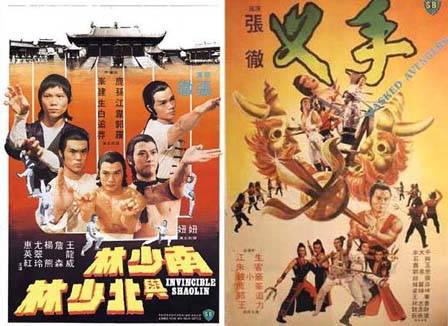 Filmography : Filmography :
Five Venoms (78)
Ten Tigers of Kwangtung (78)
Invincible Shaolin (78)
Crippled Avengers (78)
Life Gamble (79)
Shaolin Rescuers (79)
Daredevils (79)
Magnificent Ruffians (79)
Kid With The Golden Arm (79)
Heaven And Hell (80)
Two Champions of Shaolin (80)
Flag of Iron (80)
Rebel Intruders (80)
Legend of the fox (80)
Sword Stained With Royal Blood (81)
Masked Avengers (81)
House of Traps (82)
Ode to Gallantry (82)
Links :
http://en.wikipedia.org/wiki/Venom_Mob
http://www.myspace.com/venomchambertom
http://drkungfu.free.fr/persosshaw.htm
http://changcheh.0catch.com/ven-film.htm
http://www.cityonfire.com/features/venoms/
http://www.kungfucinema.com/forums/s...ead.php?t=7068
Yves Gendron (January 2010) |
 |
 |
top |
 |
 |
Ip Man / Yip Man |
 |
 |
Wilson Yip’s Ip Man is adapted from the life story of Ip Man, the grand master of the Wing Chun style of kung fu and sifu (master) of legendary kung fu superstar Bruce Lee.
Ip Man differs from the dazzingly romantic and purely fictional style of previous martial art movies. Its explosive punches and aggressive close-range combat offer a new thrill never experienced by modern day audiences.
To this date there have been neither movies nor publications about Ip Man. This movie will be the first important record of the master’s life. Ip’s persistent devotion to Wing Chun is a classic example of the love and respect shown to wushu and the freedom and spirit it represents. This movie will see the making of a modern wushu master representative of Chinese people worldwide. Ip Man is a concept, a spirit, a way of thinking – and it represents a new peak in Hong Kong’s wushu movies.
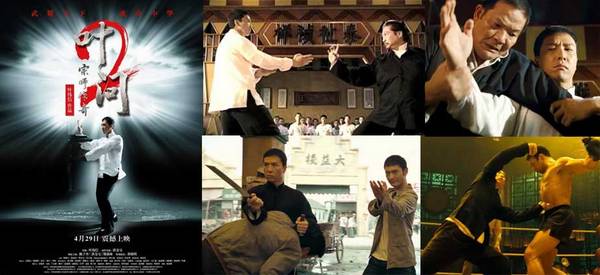
Some students of sifu Yip Man :
Bruce Lee
William Cheung Kei
David Cheung: William Cheung's brother
Wong Shun Leung (1935-1997)
Yip Chun : Yip Man's son
Leung Ting
Lok Yiu
Moy Yat (1938-2001): sifu de Dan Inosanto
See also Wing Chun.
Source: Mandarin Films Distribution Co. Ltd |
 |
 |
top |
 |
 |
Ruan Ling-yu |
 |
 |
The first great Chinese actress often compared to Greta Garbo, Ruan Lingyu mainly played for the United Photoplay Service company.
Maggie Cheung took the role of the famous actress in the film Center Stage by Stanley Kwan. |
 |
 |
top |
 |
 |
Chinese ravioli / Jiaozi |
 |
 |
Chinese ravioli or jiaozi are among the Chinese favourite dishes during Spring celebration’s eve.
Jiaozi is the Chinese title of Fruit Chan’s segment in the film Three... Extremes with Miriam Yeung and Bai Ling. |
 |
 |
top |
 |
 |
Xin nian kuai le |
 |
 |
 Happy New Year ! Happy New Year ! |
 |
 |
top |
 |
 |
Ronin |
 |
 |
Japanese word indicating a master-less samurai and used nowadays to qualify someone leading a marginal life.
Selected Filmo : Zatoichi by and with Takeshi Kitano
|
 |
 |
top |
 |
 |
Huangmei Diao |
 |
 |
| “Huangmei diao” is a Chinese film genre. It stems from the Huangmei operas (or huangmei xi) originating from the Hubei province in China. The genre appeared in China in the 1950s under the Communist ruling. It was imported in Hong Kong in the mid-1950s, where it became immensely popular. |
 |
 |
top |
 |
|

|
